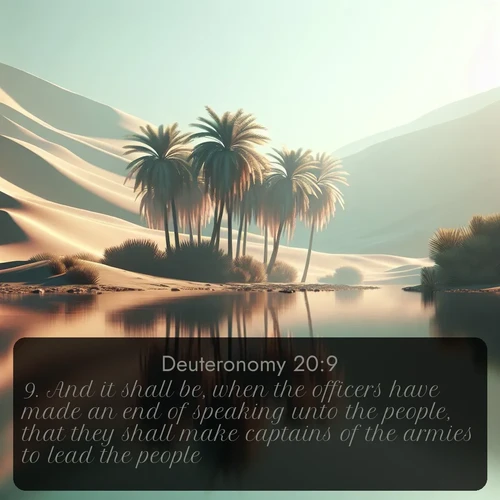Deuteronomy 20:9 plusieurs versions / traductions
English Bible Translations
9. And it shall be, when the officers have made an end of speaking unto the people, that they shall make captains of the armies to lead the people.
9. And it shall be, when the officers have made an end of speaking unto the people, that they shall appoint captains of hosts at the head of the people.
9. Then, after saying these words to the people, let the overseers put captains over the army.
9. And it shall be, when the officers have ended speaking unto the people, that they shall place captains of the hosts at the head of the people.
9. And it shall be, when the officers have made an end of speaking to the people, that they shall make captains of the armies to lead the people.
9. and it hath come to pass as the authorities finish to speak unto the people, that they have appointed princes of the hosts at the head of the people.
German Bible Translations
9. Und wenn die Amtleute ausgeredet haben mit dem Volk, so sollen sie die Hauptleute vor das Volk an die Spitze stellen.
9. Und wenn die Amtleute aufgehört haben, zu dem Volke zu reden, so sollen sie Hauptleute an die Spitze des Volkes stellen.
French Bible Translations
9. Quand les officiers auront fini de parler au peuple, ils placeront les chefs des troupes à sa tête.
9. Quand les officiers auront achevé de parler au peuple, ils placeront les chefs des troupes à la tête du peuple.
9. Quand les officiers auront achevé de parler au peuple, ils placeront les chefs des troupes à la tête du peuple.
9. Et quand les magistrats auront achevé de parler au peuple, ils établiront les chefs des armées à la tête du peuple.
9. Et aussitôt que les officiers auront achevé de parler au peuple, ils rangeront les chefs des bandes à la tête de chaque troupe.
9. Et dès que les officiers auront achevé de parler au peuple, ils établiront les chefs des troupes à la tête du peuple.
Versions with Strong Codes
Deuteronomy 20 / KJV_Strong9. And it shall be,[H1961] when the officers[H7860] have made an end[H3615] of speaking[H1696] unto[H413] the people,[H5971] that they shall make[H6485] captains[H8269] of the armies[H6635] to lead[H7218] the people.[H5971]
Strong Code definitions
H1961 hayah haw-yaw a primitive root (compare 1933); to exist, i.e. be or become, come to pass (always emphatic, and not a mere copula or auxiliary):--beacon, X altogether, be(-come), accomplished, committed, like), break, cause, come (to pass), do, faint, fall, + follow, happen, X have, last, pertain, quit(one-)self, require, X use. see H1933
H7860 shoter sho-tare' active participle of an otherwise unused root probably implication) an official superintendent or magistrate:--officer, overseer, ruler.
H3615 kalah kaw-law' a primitive root; to end, whether intransitive (to cease, be finished, perish) or transitived (to complete, prepare, consume):--accomplish, cease, consume (away), determine, destroy (utterly), be (when ... were) done, (be an) end (of), expire, (cause to) fail, faint, finish, fulfil, X fully, Xhave, leave (off), long, bring to pass, wholly reap, make clean riddance, spend, quite take away, waste.
H1696 dabar daw-bar' a primitive root; perhaps properly, to arrange; but used figuratively (of words), to speak; rarely (in a destructive sense) to subdue:--answer, appoint, bid, command, commune, declare, destroy, give, name, promise, pronounce, rehearse, say, speak, be spokesman, subdue, talk, teach, tell, think,use (entreaties), utter, X well, X work.
H413 'el ale (but only used in the shortened constructive form sel {el}); a primitive particle; properly, denoting motion towards, but occasionally used of a quiescent position, i.e. near, with or among; often in general, to:--about, according to ,after, against, among, as for, at, because(-fore, -side), both...and, by, concerning, for, from, X hath, in(- to), near, (out) of, over, through, to(-ward), under, unto, upon, whether,with(-in).
H5971 `am am from H6004; a people (as a congregated unit); specifically, a tribe (as those of Israel); hence (collectively) troops or attendants; figuratively, a flock:--folk, men, nation, people.see H6004
H6485 paqad paw-kad' a primitive root; to visit (with friendly or hostile intent); by analogy, to oversee, muster, charge, care for, miss, deposit, etc.:--appoint, X at all, avenge, bestow, (appoint to have the, give a) charge, commit, count, deliver to keep, be empty, enjoin, go see, hurt, do judgment, lack, lay up,look, make, X by any means, miss, number, officer, (make) overseer, have (the) oversight, punish, reckon, (call to) remember(-brance), set (over), sum, X surely, visit, want.
H8269 sar sar from H8323; a head person (of any rank or class):--captain (that had rule), chief (captain), general, governor, keeper, lord, ((-task- ))master, prince(-ipal), ruler, steward.see H8323
H6635 tsaba' tsaw-baw' or (feminine) tsbadah {tseb-aw-aw'}; from H6633; a mass of persons (or figuratively, things), especially reg. organized for war (an army); by implication, a campaign, literally or figuratively (specifically, hardship, worship):--appointed time, (+) army, (+) battle, company, host, service, soldiers, waiting upon, war(-fare).see H6633
H7218 ro'sh roshe from an unused root apparently meaning to shake; the head (as most easily shaken), whether literal or figurative (in many applications, of place, time, rank, itc.):--band, beginning, captain, chapiter, chief(-est place, man, things), company,end, X every (man), excellent, first, forefront, ((be-))head, height, (on) high(-est part, (priest)), X lead, X poor, principal, ruler, sum, top.
H5971 `am am from H6004; a people (as a congregated unit); specifically, a tribe (as those of Israel); hence (collectively) troops or attendants; figuratively, a flock:--folk, men, nation, people.see H6004
Prédications qui analysent les thèmes Deutéronome 20
Thèmes : Guerre contre les ennemis; Règles de conduiteRelated Sermons discussing Deuteronomy 20
Themes : Guerre contre les ennemis; Règles de conduitesee also: Bible Key Verses ; KJV Bible Images, BBE Bible images

